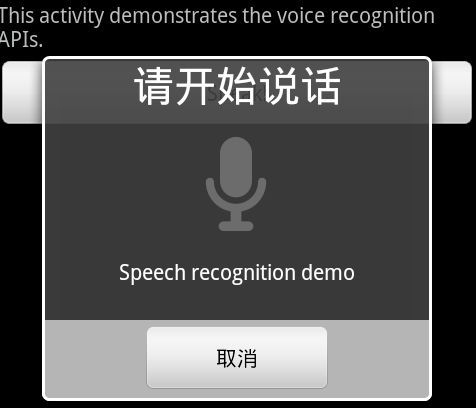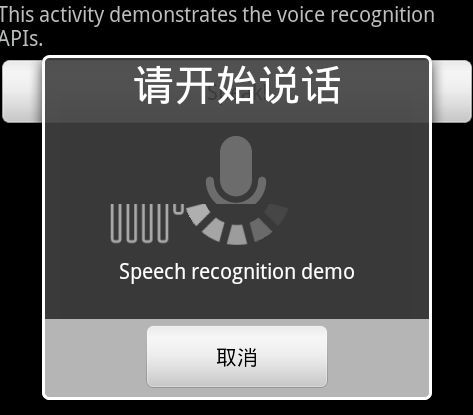【Google Voice】Android 轻松实现语音识别
苹果的iphone 有语音识别用的是Google 的技术,做为Google 力推的Android 自然会将其核心技术往Android 系统里面植入,并结合google 的云端技术将其发扬光大。
所以Google Voice Recognition在Android 的实现就变得极其轻松。

语音识别,借助于云端技术可以识别用户的语音输入,包括语音控制等技术,下面我们将利用Google 提供的Api 实现这一功能。
功能点为:通过用户语音将用户输入的语音识别出来,并打印在列表上。
功能界面如下:
用户通过点击speak按钮显示界面:

用户说完话后,将提交到云端搜索:

在云端搜索完成后,返回打印数据:
Android 轻松实现语音识别的完整代码
001
* Copyright (C) 2008 The Android Open Source Project
002
*
003
* Licensed under the Apache License, Version 2.0 (the "License");
004
* you may not use this file except in compliance with the License.
005
* You may obtain a copy of the License at
006
*
007
* http://www.apache.org/licenses/LICENSE-2.0
008
*
009
* Unless required by applicable law or agreed to in writing, software
010
* distributed under the License is distributed on an "AS IS" BASIS,
011
* WITHOUT WARRANTIES OR CONDITIONS OF ANY KIND, either express or implied.
012
* See the License for the specific language governing permissions and
013
* limitations under the License.
014
*/
015
016
package com.example.android.apis.app;
017
018
import com.example.android.apis.R;
019
020
import android.app.Activity;
021
import android.content.Intent;
022
import android.content.pm.PackageManager;
023
import android.content.pm.ResolveInfo;
024
import android.os.Bundle;
025
import android.speech.RecognizerIntent;
026
import android.view.View;
027
import android.view.View.OnClickListener;
028
import android.widget.ArrayAdapter;
029
import android.widget.Button;
030
import android.widget.ListView;
031
032
import java.util.ArrayList;
033
import java.util.List;
034
035
/**
036
* Sample code that invokes the speech recognition intent API.
037
*/
038
public class VoiceRecognition extends Activity implements OnClickListener {
039
040
private static final int VOICE_RECOGNITION_REQUEST_CODE = 1234;
041
042
private ListView mList;
043
044
/**
045
* Called with the activity is first created.
046
*/
047
@Override
048
public void onCreate(Bundle savedInstanceState) {
049
super.onCreate(savedInstanceState);
050
051
// Inflate our UI from its XML layout description.
052
setContentView(R.layout.voice_recognition);
053
054
// Get display items for later interaction
055
Button speakButton = (Button) findViewById(R.id.btn_speak);
056
057
mList = (ListView) findViewById(R.id.list);
058
059
// Check to see if a recognition activity is present
060
PackageManager pm = getPackageManager();
061
List activities = pm.queryIntentActivities(
062
new Intent(RecognizerIntent.ACTION_RECOGNIZE_SPEECH), 0);
063
if (activities.size() != 0) {
064
speakButton.setOnClickListener(this);
065
} else {
066
speakButton.setEnabled(false);
067
speakButton.setText("Recognizer not present");
068
}
069
}
070
071
/**
072
* Handle the click on the start recognition button.
073
*/
074
public void onClick(View v) {
075
if (v.getId() == R.id.btn_speak) {
076
startVoiceRecognitionActivity();
077
}
078
}
079
080
/**
081
* Fire an intent to start the speech recognition activity.
082
*/
083
private void startVoiceRecognitionActivity() {
084
Intent intent = new Intent(RecognizerIntent.ACTION_RECOGNIZE_SPEECH);
085
intent.putExtra(RecognizerIntent.EXTRA_LANGUAGE_MODEL,
086
RecognizerIntent.LANGUAGE_MODEL_FREE_FORM);
087
intent.putExtra(RecognizerIntent.EXTRA_PROMPT, "Speech recognition demo");
088
startActivityForResult(intent, VOICE_RECOGNITION_REQUEST_CODE);
089
}
090
091
/**
092
* Handle the results from the recognition activity.
093
*/
094
@Override
095
protected void onActivityResult(int requestCode, int resultCode, Intent data) {
096
if (requestCode == VOICE_RECOGNITION_REQUEST_CODE && resultCode == RESULT_OK) {
097
// Fill the list view with the strings the recognizer thought it could have heard
098
ArrayList matches = data.getStringArrayListExtra(
099
RecognizerIntent.EXTRA_RESULTS);
100
mList.setAdapter(new ArrayAdapter(this, android.R.layout.simple_list_item_1,
101
matches));
102
}
103
104
super.onActivityResult(requestCode, resultCode, data);
105
}
106